oop实验二
实验任务一
源代码

#pragma once #include <string> // 类T: 声明 class T { // 对象属性、方法 public: T(int x = 0, int y = 0); // 普通构造函数 T(const T &t); // 复制构造函数 T(T &&t); // 移动构造函数 ~T(); // 析构函数 void adjust(int ratio); // 按系数成倍调整数据 void display() const; // 以(m1, m2)形式显示T类对象信息 private: int m1, m2; // 类属性、方法 public: static int get_cnt(); // 显示当前T类对象总数 public: static const std::string doc; // 类T的描述信息 static const int max_cnt; // 类T对象上限 private: static int cnt; // 当前T类对象数目 // 类T友元函数声明 friend void func(); }; // 普通函数声明 void func();

#include "T.h" #include <iostream> #include <string> // 类T实现 // static成员数据类外初始化 const std::string T::doc{"a simple class sample"}; const int T::max_cnt = 999; int T::cnt = 0; // 类方法 int T::get_cnt() { return cnt; } // 对象方法 T::T(int x, int y): m1{x}, m2{y} { ++cnt; std::cout << "T constructor called.\n"; } T::T(const T &t): m1{t.m1}, m2{t.m2} { ++cnt; std::cout << "T copy constructor called.\n"; } T::T(T &&t): m1{t.m1}, m2{t.m2} { ++cnt; std::cout << "T move constructor called.\n"; } T::~T() { --cnt; std::cout << "T destructor called.\n"; } void T::adjust(int ratio) { m1 *= ratio; m2 *= ratio; } void T::display() const { std::cout << "(" << m1 << ", " << m2 << ")" ; } // 普通函数实现 void func() { T t5(42); t5.m2 = 2049; std::cout << "t5 = "; t5.display(); std::cout << '\n'; }

#include "T.h" #include <iostream> void test_T(); int main() { std::cout << "test Class T: \n"; test_T(); std::cout << "\ntest friend func: \n"; func(); } void test_T() { using std::cout; using std::endl; cout << "T info: " << T::doc << endl; cout << "T objects'max count: " << T::max_cnt << endl; cout << "T objects'current count: " << T::get_cnt() << endl << endl; T t1; cout << "t1 = "; t1.display(); cout << endl; T t2(3, 4); cout << "t2 = "; t2.display(); cout << endl; T t3(t2); t3.adjust(2); cout << "t3 = "; t3.display(); cout << endl; T t4(std::move(t2)); cout << "t4 = "; t4.display(); cout << endl; cout << "test: T objects'current count: " << T::get_cnt() << endl; }
运行结果
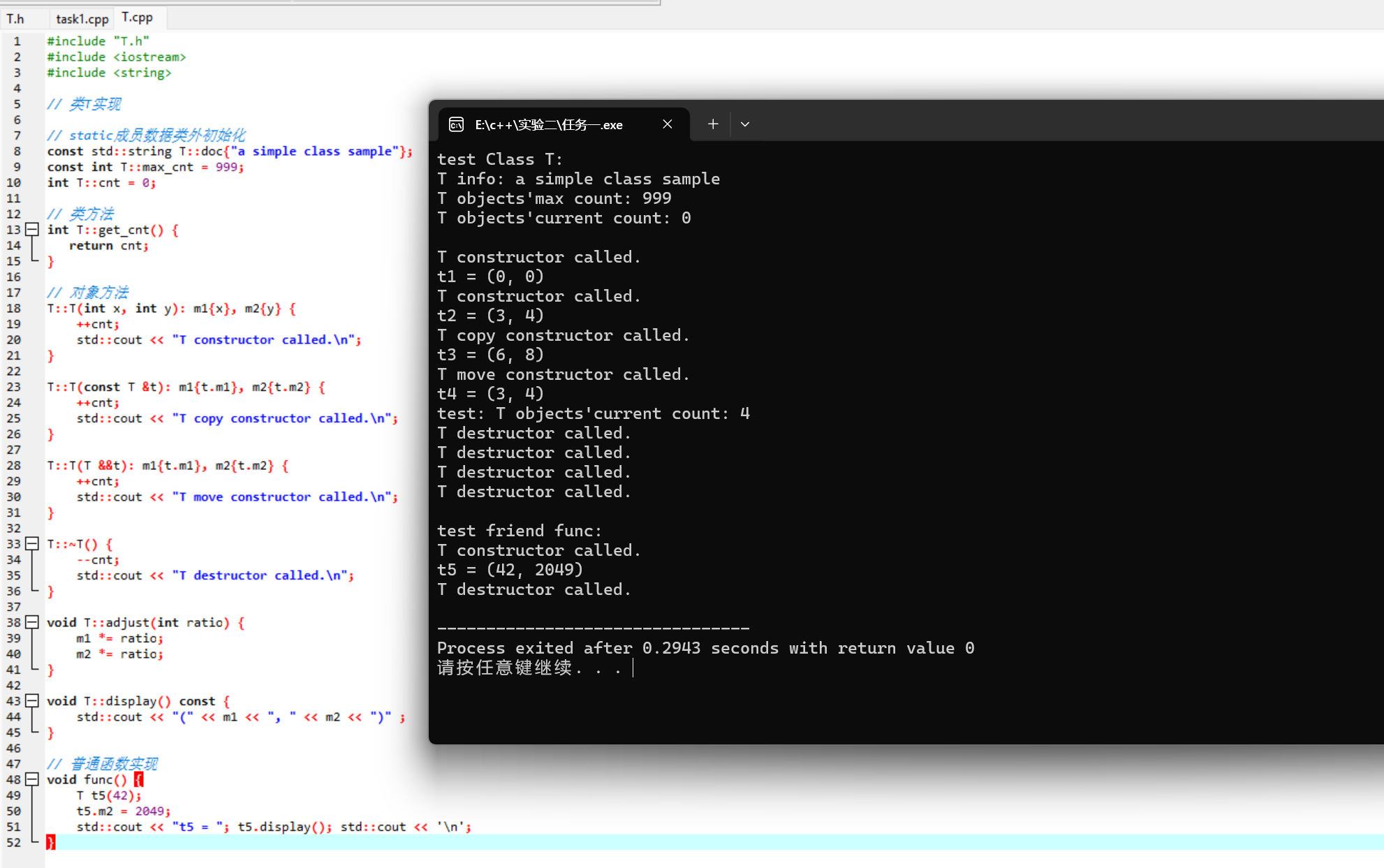
问题一:不能正常运行。报错结果如下
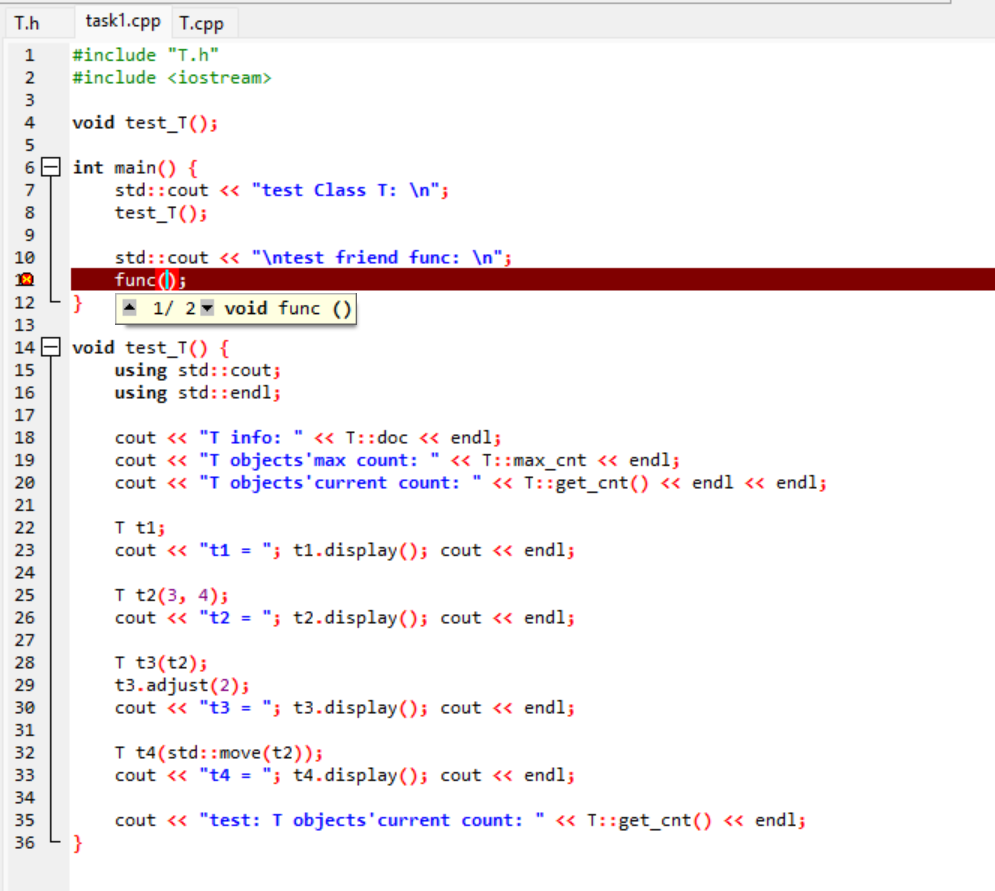

原因:如果删去了viod func(),在task1.cpp文件中要调用fuc函数时会报错,因为没有找到fuc函数的声明。换句话来说就是友元函数不能代替函数的声明。
问题二:
普通构造函数,功能:用于创建类T对象时可以对对象的成员变量进行初始化,且如果有默认参数,则在没有传递参数时使用默认参数,在有传递参数时使用传递参数。调用时机:用于创建类T新对象。
复制构造函数,功能:用一个已经存在的T类对象t来创建一个新的T类对象,即新对象是副本,会复制已有对象的成员变量值。const则表示在复制过程中不会修改被复制的原有代码。调用时机:用于一个已有的T类对象创建一个新的T类对象时使用。
移动构造函数,功能:将一个T类对象的变量值移动到新对象中,类似于剪切粘贴。调用时机:当函数返回T类对象并用该返回值初始化新对象时。
析构函数,功能:在T类对象生命周期结束时,执行清理工作。调用时机:用于当T类对象的作用域结束时。
问题三:不能运行,结果如下。

错误原因是静态成员变量重复定义。
实验任务二
源代码

#include "Complex.h" #include <iostream> #include <iomanip> #include <complex> void test_Complex(); void test_std_complex(); int main() { std::cout << "*******测试1: 自定义类Complex*******\n"; test_Complex(); std::cout << "\n*******测试2: 标准库模板类complex*******\n"; test_std_complex(); } void test_Complex() { using std::cout; using std::endl; using std::boolalpha; cout << "类成员测试: " << endl; cout << Complex::doc << endl << endl; cout << "Complex对象测试: " << endl; Complex c1; Complex c2(3, -4); Complex c3(c2); Complex c4 = c2; const Complex c5(3.5); cout << "c1 = "; output(c1); cout << endl; cout << "c2 = "; output(c2); cout << endl; cout << "c3 = "; output(c3); cout << endl; cout << "c4 = "; output(c4); cout << endl; cout << "c5.real = " << c5.get_real() << ", c5.imag = " << c5.get_imag() << endl << endl; cout << "复数运算测试: " << endl; cout << "abs(c2) = " << abs(c2) << endl; c1.add(c2); cout << "c1 += c2, c1 = "; output(c1); cout << endl; cout << boolalpha; cout << "c1 == c2 : " << is_equal(c1, c2) << endl; cout << "c1 != c2 : " << is_not_equal(c1, c2) << endl; c4 = add(c2, c3); cout << "c4 = c2 + c3, c4 = "; output(c4); cout << endl; } void test_std_complex() { using std::cout; using std::endl; using std::boolalpha; cout << "std::complex<double>对象测试: " << endl; std::complex<double> c1; std::complex<double> c2(3, -4); std::complex<double> c3(c2); std::complex<double> c4 = c2; const std::complex<double> c5(3.5); cout << "c1 = " << c1 << endl; cout << "c2 = " << c2 << endl; cout << "c3 = " << c3 << endl; cout << "c4 = " << c4 << endl; cout << "c5.real = " << c5.real() << ", c5.imag = " << c5.imag() << endl << endl; cout << "复数运算测试: " << endl; cout << "abs(c2) = 5" << endl; c1 += c2; cout << "c1 += c2, c1 = " << c1 << endl; cout << boolalpha; cout << "c1 == c2 : " << (c1 == c2) << endl; cout << "c1 != c2 : " << (c1 != c2) << endl; c4 = c2 + c3; cout << "c4 = c2 + c3, c4 = " << c4 << endl; }

#include "Complex.h" #include <cmath> const std::string Complex::doc = "a simplified Complex class"; Complex::Complex(double r,double i) : real(r), imag(i) {} Complex::Complex(const Complex&other) : real(other.real), imag(other.imag) {} double Complex::get_real() const { return real; } double Complex::get_imag() const { return imag; } void Complex::add(const Complex& other) { real += other.real; imag += other.imag; } void output(const Complex& c) { std::cout << c.real; if (c.imag >= 0) { std::cout << " + " << c.imag << "i"; } else { std::cout << " - " << -c.imag << "i"; } } double abs(const Complex& c) { return std::sqrt(c.real*c.real+c.imag*c.imag); } Complex add(const Complex&c1, const Complex&c2) { return Complex(c1.real + c2.real, c1.imag + c2.imag); } bool is_equal(const Complex&c1, const Complex&c2) { return c1.real==c2.real && c1.imag==c2.imag; } bool is_not_equal(const Complex&c1, const Complex&c2) { return !is_equal(c1,c2); }

#include <string> #include <iostream> class Complex { private: double real; double imag; public: static const std::string doc; Complex(double r = 0.0, double i = 0.0); Complex(const Complex& other); double get_real() const; double get_imag() const; void add(const Complex& other); friend void output(const Complex& c); friend double abs(const Complex& c); friend Complex add(const Complex& c1, const Complex& c2); friend bool is_equal(const Complex& c1, const Complex& c2); friend bool is_not_equal(const Complex& c1, const Complex& c2); }; void output(const Complex& c); double abs(const Complex& c); Complex add(const Complex& c1, const Complex& c2); bool is_equal(const Complex& c1, const Complex& c2); bool is_not_equal(const Complex& c1, const Complex& c2);
运行结果
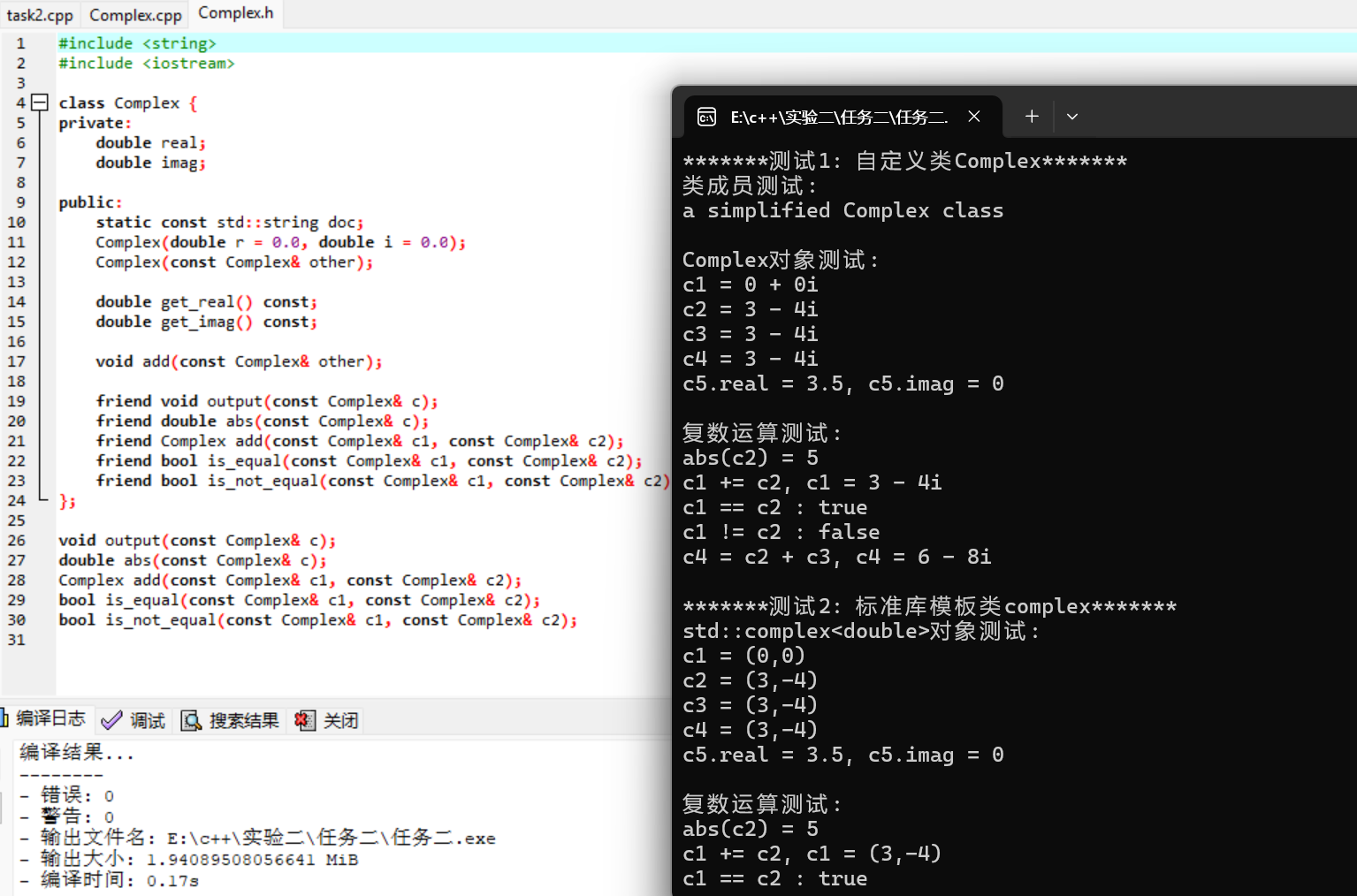
问题一:标准库模板complex模板更简洁。函数和运算的内在有关联,和数学表达式具有类似一致性且不用额外记忆函数名。
问题二:2.1 是。output函数需要读取c.real,c.imag来格式化输出,abs函数需要同时使用实部和虚部,add和比较函数需要同时读取两个复数的实部和虚部。
2.2否。因为abs是普通函数。
2.3格式化输出/输入需要直接读取或设置多个私有成员,且不为了绕过封装而是为了扩展接口,因为友元函数有时可能会破坏封装性。
问题三:私有拷贝构造函数,在complex.h中private里面添加这行代码的声明。
实验任务三
源代码

#include "PlayerControl.h" #include <iostream> void test() { PlayerControl controller; std::string control_str; std::cout << "Enter Control: (play/pause/next/prev/stop/quit):\n"; while(std::cin >> control_str) { if(control_str == "quit") break; ControlType cmd = controller.parse(control_str); controller.execute(cmd); std::cout << "Current Player control: " << PlayerControl::get_cnt() << "\n\n"; } } int main() { test(); }

#pragma once #include <string> enum class ControlType {Play,Pause,Next,Prev,Stop,Unknown}; class PlayerControl{ private: static int total_cnt; public: PlayerControl(); static int get_cnt; ControlType parse(const std::string& control_str); void execute(ControlType cmd) const };

#include <iostream> #include <algorithm> int PlayerControl::total_cnt = 0; PlayerControl::PlayerControl() {} ControlType PlayerControl::parse(const std::string& control_str) { std::string sent= control_str; std::transform(sent.begin(),sent.end(),sent.begin(), [](unsigned char c) {return std::tolower(c); }); ControlType res; if (sent=="play") res=ControlType::Play; else if(sent=="pause") res=ControlType::Pause; else if(sent=="next") res=ControlType::Next; else if(sent=="prev") res = ControlType::Prev; else if(sent=="stop") res=ControlType::Stop; else res=ControlType::Unknown; total_cnt++; return res; } void PlayerControl::execute(ControlType cmd) const { switch (cmd) { case ControlType::Play: std::cout << "[play] Playing music...\n"; break; case ControlType::Pause: std::cout << "[Pause] Music paused\n"; break; case ControlType::Next: std::cout << "[Next] Skipping to next track\n"; break; case ControlType::Prev: std::cout << "[Prev] Back to previous track\n"; break; case ControlType::Stop: std::cout << "[Stop] Music stopped\n"; break; default: std::cout << "[Error] unknown control\n"; break; } } int PlayerControl::get_cnt() { return total_cnt; }
运行结果
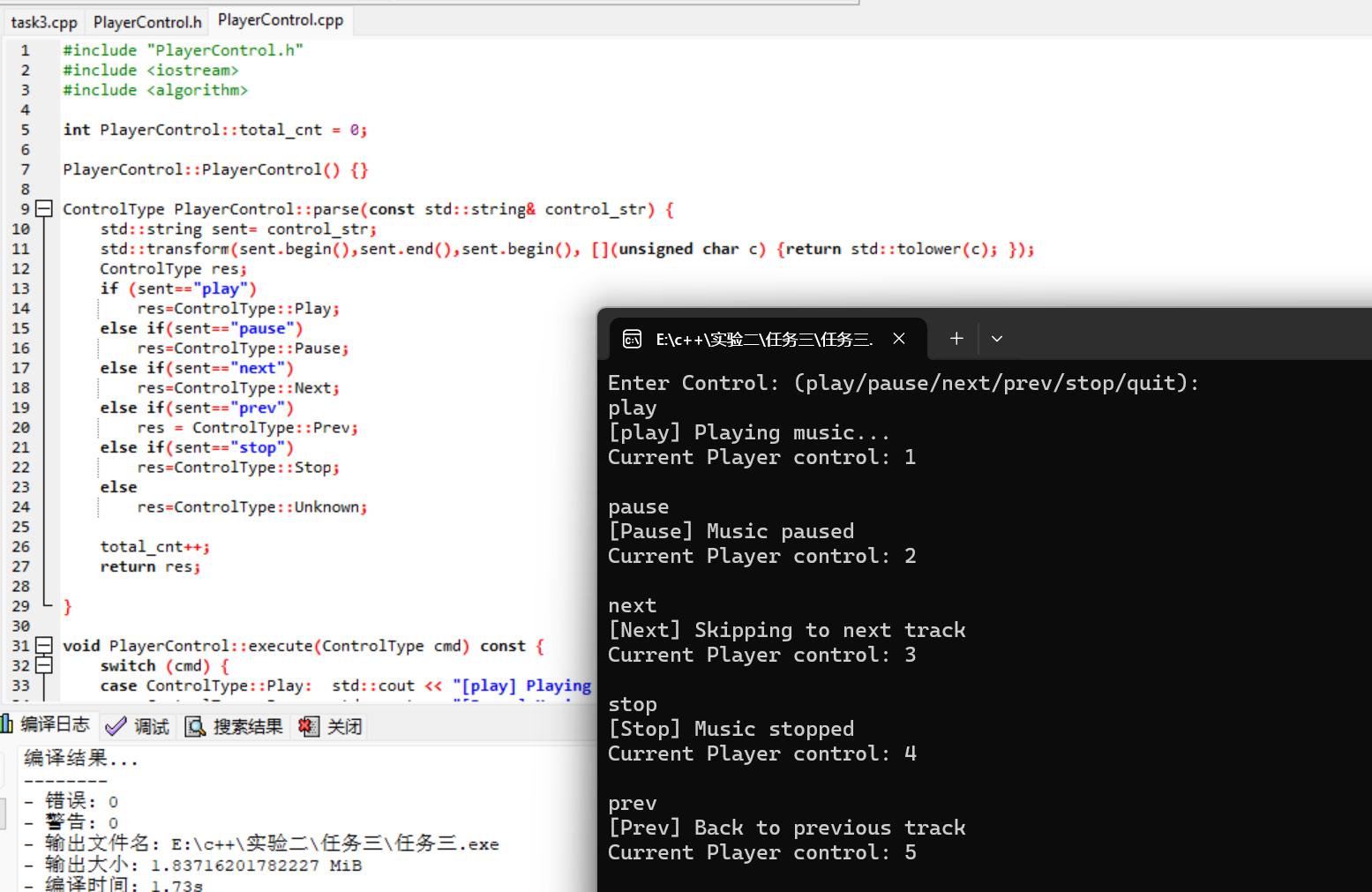
实验任务四
源代码

#include "Fraction.h" #include <iostream> using namespace std; void test1(); void test2(); int main() { cout << "测试1: Fraction类基础功能测试\n"; test1(); cout << "\n测试2: 分母为0测试: \n"; test2(); return 0; } void test1() { cout << "Fraction类测试: " << endl; cout << Fraction::doc << endl << endl; Fraction f1(5); Fraction f2(3, -4), f3(-18, 12); Fraction f4(f3); cout << "f1 = "; output(f1); cout << endl; cout << "f2 = "; output(f2); cout << endl; cout << "f3 = "; output(f3); cout << endl; cout << "f4 = "; output(f4); cout << endl; const Fraction f5(f4.negative()); cout << "f5 = "; output(f5); cout << endl; cout << "f5.get_up() = " << f5.get_up() << ", f5.get_down() = " << f5.get_down() << endl; cout << "f1 + f2 = "; output(add(f1, f2)); cout << endl; cout << "f1 - f2 = "; output(sub(f1, f2)); cout << endl; cout << "f1 * f2 = "; output(mul(f1, f2)); cout << endl; cout << "f1 / f2 = "; output(div(f1, f2)); cout << endl; cout << "f4 + f5 = "; output(add(f4, f5)); cout << endl; } void test2() { Fraction f6(42, 55), f7(0, 3); cout << "f6 = "; output(f6); cout << endl; cout << "f7 = "; output(f7); cout << endl; cout << "f6 / f7 = "; output(div(f6, f7)); cout << endl; }

#include "Fraction.h" #include <iostream> #include <stdexcept> #include <cmath> using namespace std; const string Fraction::doc = "Fraction类 v 0.01版。\n目前仅支持分数对象的构造、输出、加/减/乘/除运算。"; Fraction::Fraction(int up, int down) : up(up), down(down) { if (down == 0) { throw invalid_argument("分母不能为0"); } simplify(); } Fraction::Fraction(const Fraction& other) : up(other.up), down(other.down) { simplify(); } int Fraction::get_up() const { return up; } int Fraction::get_down() const { return down; } Fraction Fraction::negative() const { return Fraction(-up, down); } int Fraction::gcd(int a, int b) const { a = abs(a); b = abs(b); while (b != 0) { int temp = b; b = a % b; a = temp; } return a; } void Fraction::simplify() { if (down < 0) { up = -up; down = -down; } int common = gcd(up, down); if (common != 0) { up /= common; down /= common; } if (up == 0) { down = 1; } } void output(const Fraction& f) { if (f.down == 1) { cout << f.up; } else { cout << f.up << "/" << f.down; } } Fraction add(const Fraction& f1, const Fraction& f2) { int new_up = f1.up * f2.down + f2.up * f1.down; int new_down = f1.down * f2.down; return Fraction(new_up, new_down); } Fraction sub(const Fraction& f1, const Fraction& f2) { int new_up = f1.up * f2.down - f2.up * f1.down; int new_down = f1.down * f2.down; return Fraction(new_up, new_down); } Fraction mul(const Fraction& f1, const Fraction& f2) { int new_up = f1.up * f2.up; int new_down = f1.down * f2.down; return Fraction(new_up, new_down); } Fraction div(const Fraction& f1, const Fraction& f2) { if (f2.up == 0) { cout << "分母不能为0"; return Fraction(0, 1); } int new_up = f1.up * f2.down; int new_down = f1.down * f2.up; return Fraction(new_up, new_down); }

#include <string> class Fraction { public: static const std::string doc; Fraction(int up = 0, int down = 1); Fraction(const Fraction& other); int get_up() const; int get_down() const; Fraction negative() const; friend void output(const Fraction& f); friend Fraction add(const Fraction& f1, const Fraction& f2); friend Fraction sub(const Fraction& f1, const Fraction& f2); friend Fraction mul(const Fraction& f1, const Fraction& f2); friend Fraction div(const Fraction& f1, const Fraction& f2); private: int up; int down; void simplify(); int gcd(int a, int b) const; }; void output(const Fraction& f); Fraction add(const Fraction& f1, const Fraction& f2); Fraction sub(const Fraction& f1, const Fraction& f2); Fraction mul(const Fraction& f1, const Fraction& f2); Fraction div(const Fraction& f1, const Fraction& f2);
运行结果
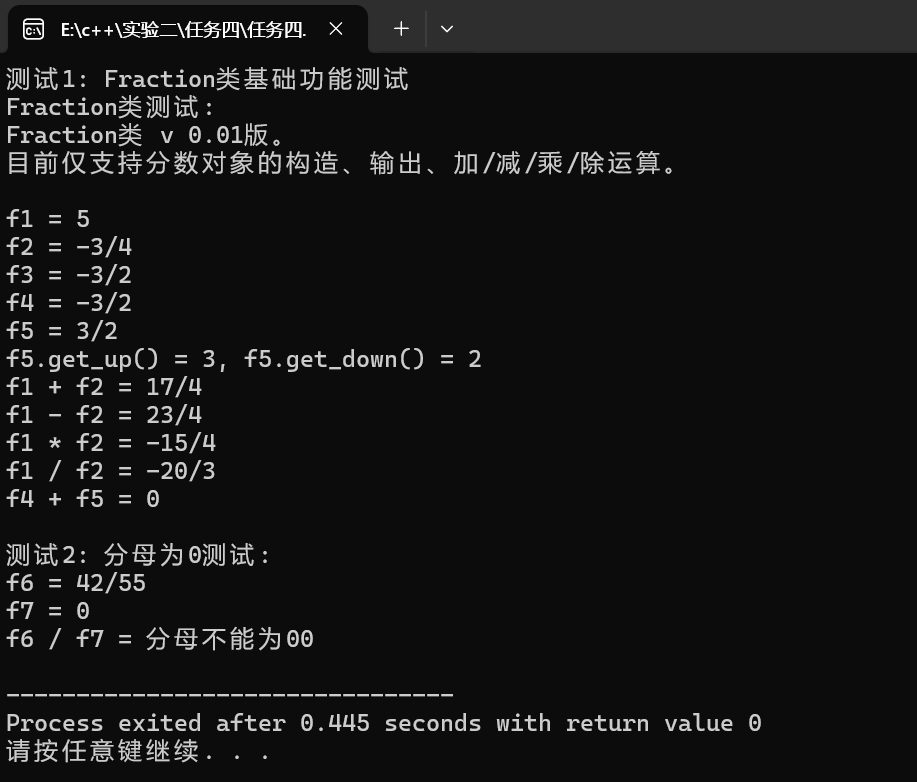
问题:选择友元函数方案。
理由:第一,这些函数都需要访问分子和分母,即类的私有成员,而友元函数可以直接访问,这样可以提高效率。第二,静态成员函数不依赖于对象实例的操作,但这个实例中依赖,故而不合适。第三,命名空间无法直接访问私有成员,这样效率会降低。虽然友元函数比其他两个更合适,但也有缺点,他破坏了封装性,因为可以访问类的私有成员,所以有可能导致类的内部状态被修改,不利于维护。





 浙公网安备 33010602011771号
浙公网安备 33010602011771号